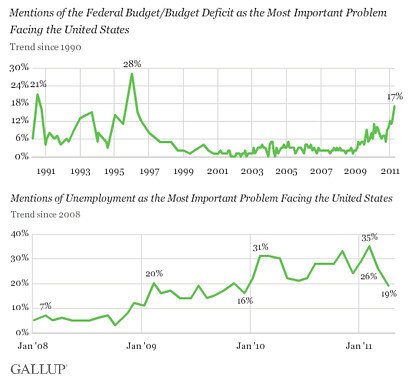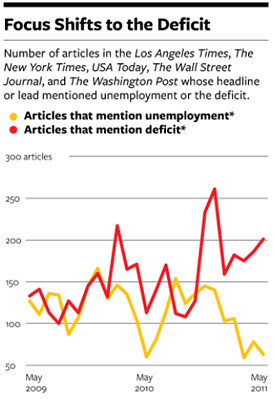While all eyes remain fixed on the Republican debt ceiling hostage drama in Washington, the deficit that really matters has all but disappeared from the American political debate. Even as Vice President Biden confidently predicted his bipartisan group of budget negotiators would slash $1 trillion in spending, forecasters are once again downgrading their estimates for second quarter economic growth. All of which means that with 9% unemployment and record-low labor force participation, the jobs deficit should be job number one for both political parties.
With first-time jobless claims edging back up and first quarter growth lowered to 1.8%, Macroeconomic Advisors dropping their Q2 GDP growth forecast from 3.2% to 2.8%. That prompted Paul Krugman was quick to join Brad Delong in sounding the alarm. It's "time to panic," Delong warned, adding that real second quarter GDP growth "looks slow enough to put no upward pressure at all on the employment-to-population ratio." Krugman, who ominously cautioned last year about "Third Depression" in the form of prolonged economic weakness, lamented that:
As Brad says, these estimates now suggest that we have now gone through a year and a half of "recovery" that has failed to make any progress toward closing the gap between what the economy should be producing and what it's actually producing.
That output gap, the Washington Post showed using a helpful interactive graphic last fall, explains "why it doesn't feel like a recovery." While U.S. GDP has now surpassed its pre-Bush recession level, the $900 billion divide between the amount the United States can produce and what it is actually producing "explains why we feel so miserable more than a year into what is technically classified as an economic recovery." Worse still, as the Post charted at the time, at current rates of population and productivity growth, the economy would have to expand at an average of 3% a year to reduce unemployment to 5% by 2020.
Right now, that's just not happening. While the recession officially ended in 2009, the current recovery is proceeding at a much more sluggish rate than usual. The result, as the thoroughly depressing chart which follows from the St. Louis Fed shows, is persistent joblessness hovering around 9%. Just as frightening, employment as percentage of U.S. population has nose-dived. (As the New York Times noted earlier this month, "men currently have their lowest labor force participation rate since the Labor Department began keeping track since 1948."
For months, House Speaker John Boehner has insisted that "getting Americans back to work has been and will continue to be the number-one priority for our new majority." Of course, that promise wasn't just belied by Boehner's choices instead to fast-track draconian new anti-abortion legislation or his April declaration that repealing the Obama health care law was "our No. 1 priority." As the data show, the GOP has successfully transformed Americans' focus onto another issue altogether: the budget deficit.
"Reagan," Vice President Dick Cheney famously declared in 2002, "proved deficits don't matter." Unless, that is, a Democrat is in the White House. After all, while Ronald Reagan tripled the national debt and George W. Bush doubled it again, each Republican was rewarded with a second term in office. But as the Gallup polling data show, concern over the federal deficit hasn't been this high since Democratic budget balancer Bill Clinton was in office. All of which suggest the Republicans' born-again disdain for deficits ranks among the greatest - and most successful - political double-standards in recent memory.
The triumph of the GOP messaging machine is reflected in an April Washington Post/Pew Research poll. In just the four months since the Republican majority took control of the House, the percentage of Americans believing the budget deficit is a major problem which must be addressed now catapulted from 70% to 81%. But even more revealing is an April Gallup survey which showed the deficit (17%) rivaling the unemployment (19%) and the overall state of the economy (26%). And as it turns out, those cyclical swings in budget angst reflect the complete victory of the conservative deficit narrative.
The Republicans' misdirection on debt and deficits is reflecting in myriad other ways as well. Despite having voted seven times to raise the debt ceiling under President Bush (as well as for the Bush tax cuts the unfunded wars in Iraq and Afghanistan responsible for most of the nation's debt over the next decade), GOP leaders have bamboozled Americans by a 48% to 35% margin that raising the debt limit would be worse than the cataclysm of a U.S. default. And as the National Journal revealed last week, the shift from jobs to deficits in American political discourse is reflected in media coverage as well:
Major U.S. newspapers have increasingly shifted their attention away from coverage of unemployment in recent months while greatly intensifying their focus on the deficit, a National Journal analysis shows.
The analysis -- based on a measure of how often the words "unemployment" and "deficit" appear in major publications -- portrays a dramatically shifting landscape of coverage over the past two years, as the debate over how to fix the federal deficit has risen to prominence and the question of how to handle still-high unemployment has faded from the media's consciousness...
Mentions of unemployment have been dwindling since they spiked to 154 in the month ending August 15, 2010; over the month ending Sunday, there were 63. Deficit mentions, meanwhile, surged up to 261 in the month ending December 15, 2010, when the leaders of President Obama's deficit commission released their final report. Mentions of the deficit remained higher after the commission's work wrapped up and as House Republicans and then the White House unveiled dueling proposals. In the month ending Sunday, there were 201 mentions.
Writing in the Washington Post last month, Eugene Robinson fretted over "the word most politicians ignore: Jobs." What is it, he asked, "about the word 'jobs' that our nation's leaders fail to understand?"
Sadly, Republicans won't do anything about jobs and have made sure that Democrats can't. Despite GOP claims to the contrary, the Obama stimulus worked. (By last June, the nonpartisan Congressional Budget Office (CBO) estimated the Obama stimulus program had saved or created up to 3.3 million jobs, lowered the unemployment rate by as much as 1.8% and boosted GDP by 4.5%. For his part, former John McCain adviser Mark Zandi in August concluded that the combined federal interventions beginning in the fall of 2008 prevented the Great Recession from becoming Depression 2.0.) But as Paul Krugman predicted before and Ezra Klein explained after, the underfunding of and overly optimistic unemployment predictions for the American Recovery and Reinvestment Act when it was being crafted ensured the perception of failure, thus guaranteeing there would not be a second. So much the simplest way to trim the budget deficit cited by the New York Times' David Leonhardt: cultivate growth.
In March, former Obama administration economic adviser Christina Romer called the lack of action on job creation "shameful."
'I frankly don't understand why policy makers aren't more worried about the suffering of real families. I think there are tools we have tools...that we can use, and I think it's shameful that we're not using them....If I have a complaint about policy these days, it's that we're not doing enough. That goes all the way up to the Federal Reserve, [which] could be taking more aggressive action. It goes to the Congress and the Administration - there are fiscal policy actions they could be taking."
Reacting to the latest GDP downgrades and the implication for the American jobs deficit, a panicked Brad Delong suggested what some of those actions might be. It is, he said, "time for pulling more spending from the future forward into the present, and pushing more taxes from the present back into the future." Writing in the New Yorks Times, David Leonhardt asked, "The economy is wavering; does Washington notice?"
Sadly, the answer appears to be no. Unfortunately for the millions of unemployed, Republicans have intimidated Democrats and conned the American people into believing the budget deficit is the only one that matters.
(An earlier version of this piece appeared at Perrspectives.)


















